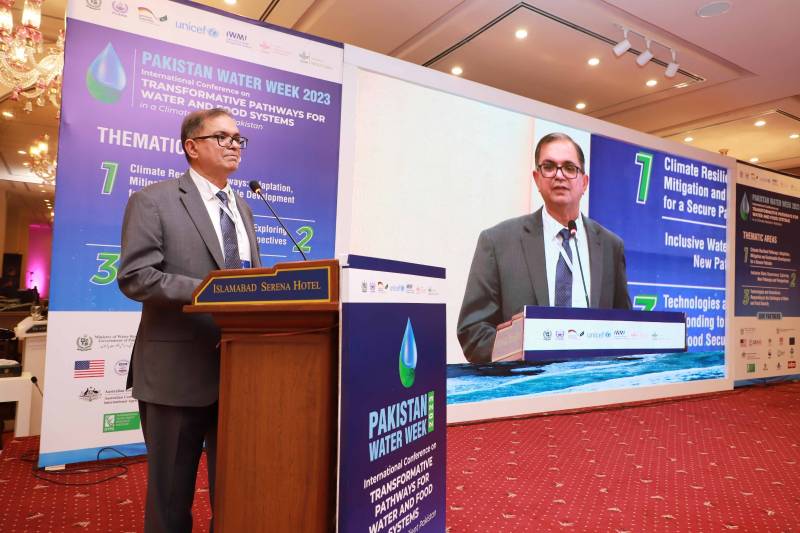Experts in water management, agriculturalists, government officials, and business leaders from different parts of the world came together in Islamabad, the capital of Pakistan, to discuss practical strategies to tackle water scarcity and enhance the skills of the general public.
The international conference focused on 'Transformative Pathways for Water and Food Systems in a Climate Resilience in Pakistan', bringing together diverse stakeholders to collaborate on the shared mission of achieving the indispensable role of water in life and development.
Pakistan Water Week 2023 was organized by the International Water Management Institute (IWMI) in partnership with the Pakistan Council of Research in Water Resources (PCRWR) through the Ministry of Water Resources (MoWR) and support from UNICEF, GIZ Pakistan.
The event emerged as a pivotal platform for addressing the critical challenges of water scarcity, fragility, conflicts, and migration. IWMI, in particular, was pivotal in spotlighting the importance of managing water resources and conducting research to mitigate these challenges.
“It’s a great week where we had to engage with a lot of people from Pakistan and outside who’ve seen a lot of external speakers coming in and sharing their practice practices,” Mark Smith, Director General, IWMI, told media sidelines of the event.
“It was vital to have this dialogue, especially in a water-scarist country. Our overarching goal is to contribute meaningfully to constructing a future characterized by resilience and sustainability, particularly in the realms of water, food, and ecosystems."
Addressing the closing ceremony, President Dr Arif Alvi said that Pakistan needs to employ more innovative and less water-intensive practices, such as drip and spray irrigation in agriculture to avert the looming water shortage crisis.
"The agriculture sector consumes around 95% of the country's water, requiring immediate planning and reforms to improve efficiency," he added.
He pointed out that Pakistan's water crisis is a pressing issue, worsened by population growth, urbanization, industrialization, depletion of resources, environmental problems, climate change, and irrational human behavior.
The President emphasized research and technological innovation to promote modern agricultural technologies at the grassroots level.
Director Water, Food and Ecosystems, IWMI, Dr. Mohsin Hafeez, said the conference will provide valuable insights to government and policymakers to build Pakistan's resilience.
Meanwhile, the Director General PCRWR, Dr. Hifza Rasheed, said Water Week is a pivotal platform, fostering collaboration among diverse stakeholders. "As we reflect on its significance, it becomes evident that this annual event not only provides opportunities for meaningful dialogue but also lays the foundation for sustainable water management practices."
The five-day event, held for the third time in Islamabad, welcomed more than 10,000 participants in person and online from 15 countries and included the winners of the water board game, essay writing, poster, and debate competitions.
Throughout the week, participants engaged in sessions and side events, including Technologies and Innovations: Responding to the Challenges of Water and Food Security,” focused on cutting-edge technologies and innovations offering solutions to the complex challenges in Pakistan.






